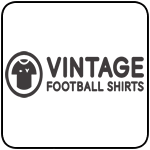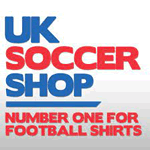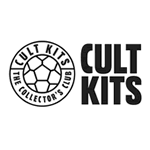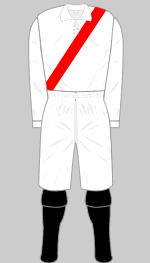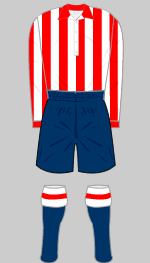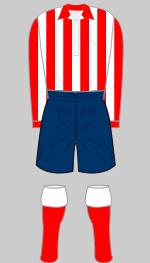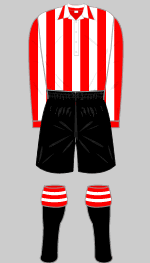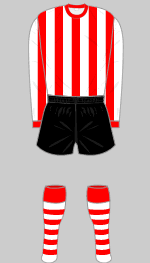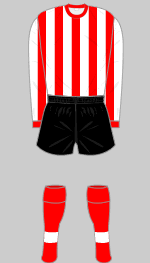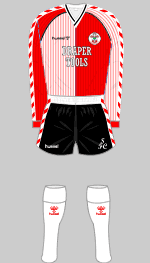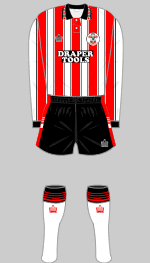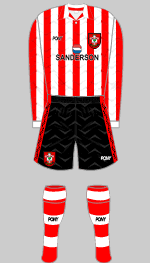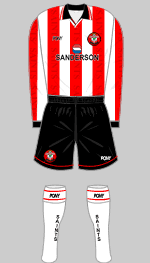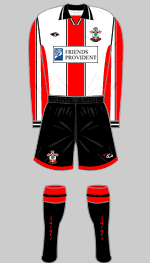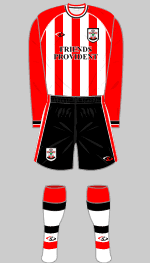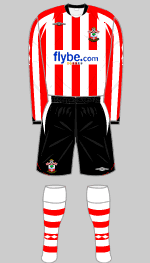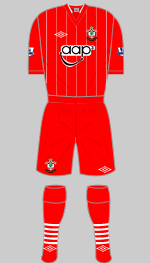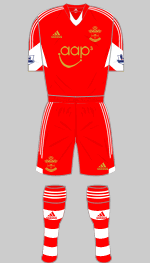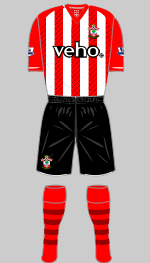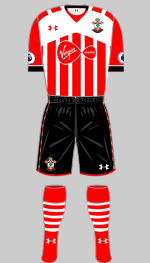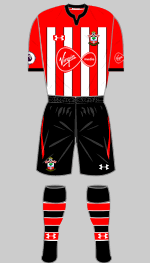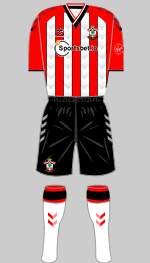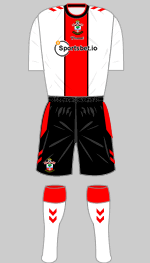Kit History
St Mary's YMA
1885
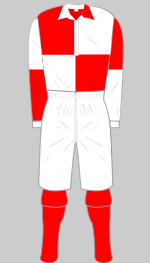
1889-1890 b q
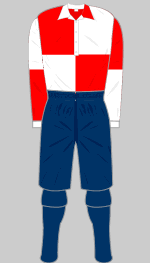
1891-1894 b q
Southampton St Mary's
1894
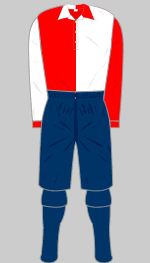
1894-1895 b e m q
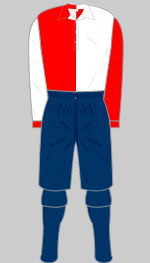
1895-1896 m q
Southampton
1896
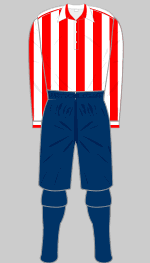
1896-1900 b m q
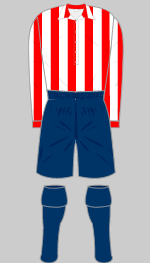
1900-1902 m q
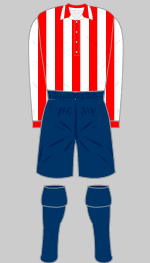
1902-1903 b q
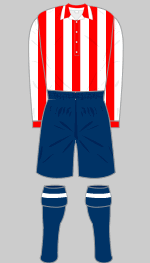
1903-1904 m q
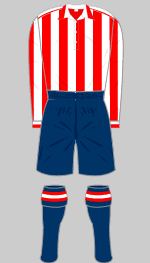
1904-1920 b q
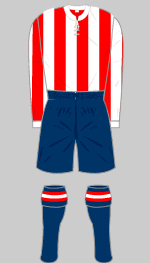
1920-1921 b q
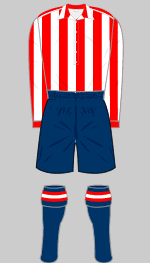
1921-1924 b q
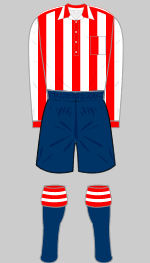
1924-1927 b q r
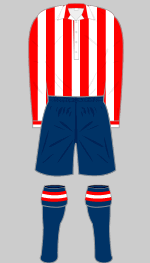
1927-1928 u
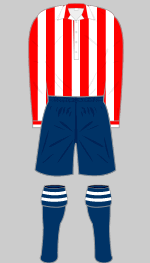
1928-1930 v
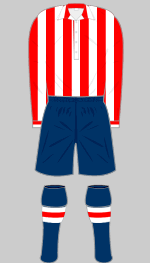
1930-1931 u
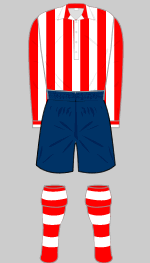
1934-1937 b q u
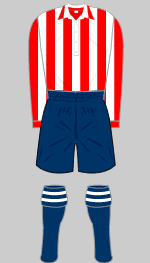
1937-1939 b l q
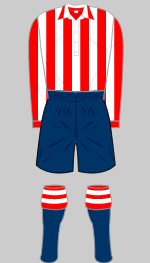
1939-1941 q
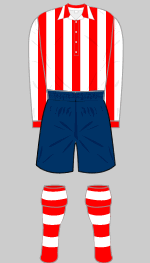
1941-1942 q
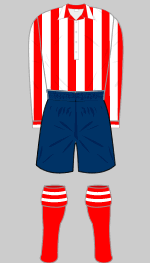
1945-1946 b l q u
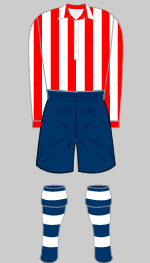
1946-1947 b l m q
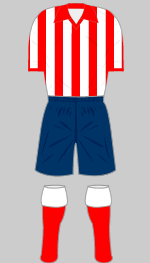
1948-1949 2 u
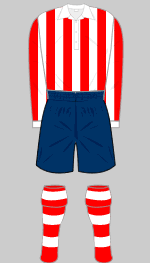
1949-1950 b l q
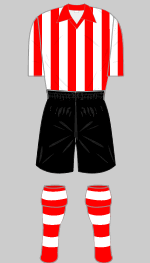
1950-1951 b l q
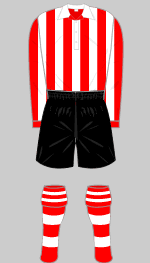
1953-1957 b m
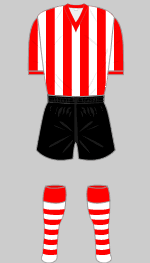
1957-1959 b m
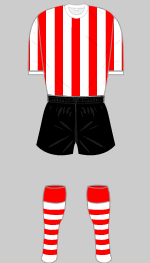
1959-1962 b r
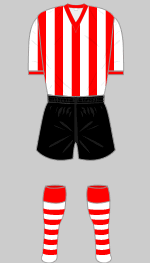
1965-1966 2 s
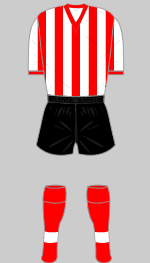
August 1972 c k
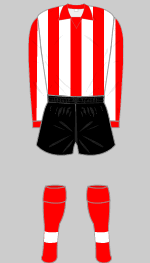
Sept 1972-1973 b
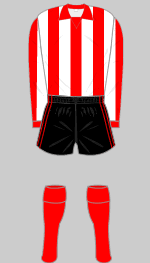
1973-1974 c i
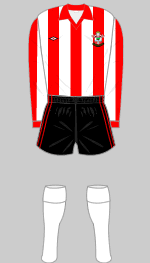
1974-1976 c i k
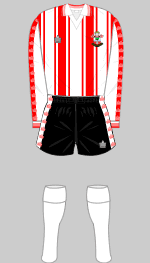
1976-1977 c i k
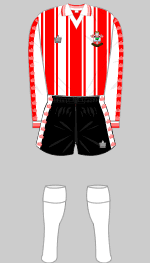
1976-77 variant k
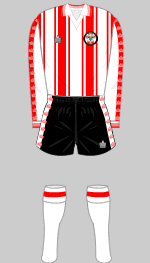
1977-1978 c i
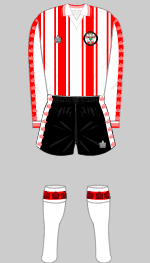
1978-1980 c
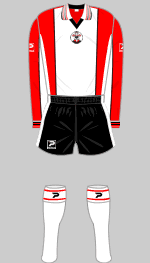
Aug-Sept1980 c k
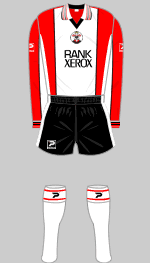
Sept 1980-83 c g h k
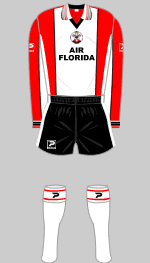
1983-1984 c g h
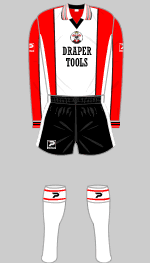
1984-1985 c g h
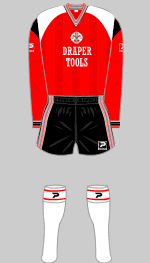
1985-1987 c g h n
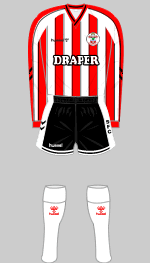
August 1989 c g h n
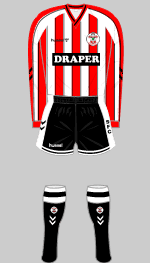
Sept 1989-1990 k
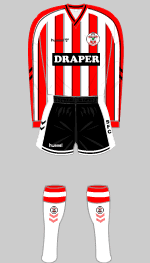
1990-1991 c g h k
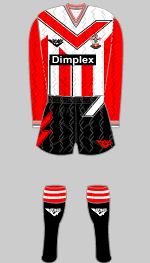
1993-1995 c h k
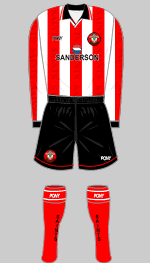
1998-1999 n
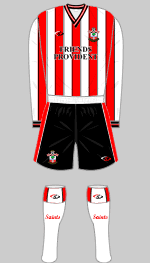
2001-2003 c g h
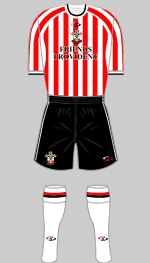
2003-2004 Eur o
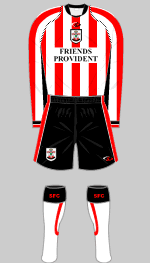
2005-2006 d
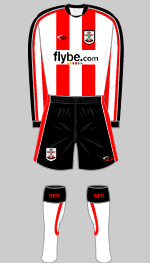
2006-2008 d
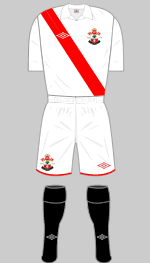
2010-2011 d
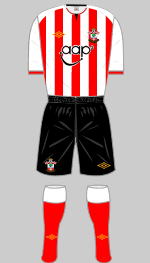
2011-2012 d
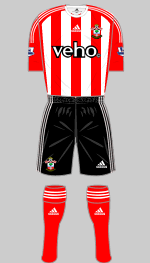
2015-2016 e
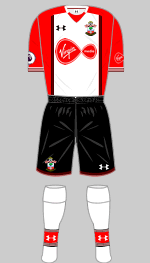
2017-2018 e
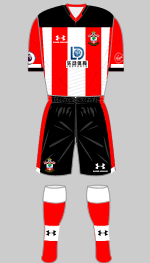
2019-2020 a
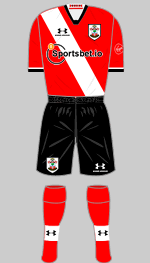
2020-2021 a
Background
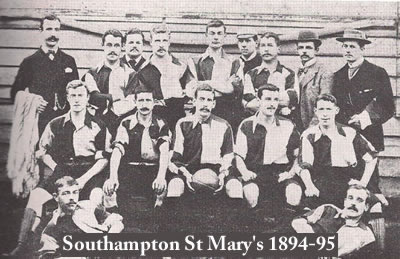 The origins of Southampton
FC lie with the Young Men's Association of St Mary's Church who founded
St Mary's YMA FC in November 1885. The fledgling club won the Hampshire
Junior Cup in 1887, their first honour. Their nickname of "The Saints" was coined in 1888-89 when an enterprising soul at the Ordnance Office designed a white shield with a diagonal red stripe (the team's colours at the time) and the words "Play Up Saints" printed upon it. Hundreds of replicas were distributed throughout the town and worn in supporters' hat bands.
The origins of Southampton
FC lie with the Young Men's Association of St Mary's Church who founded
St Mary's YMA FC in November 1885. The fledgling club won the Hampshire
Junior Cup in 1887, their first honour. Their nickname of "The Saints" was coined in 1888-89 when an enterprising soul at the Ordnance Office designed a white shield with a diagonal red stripe (the team's colours at the time) and the words "Play Up Saints" printed upon it. Hundreds of replicas were distributed throughout the town and worn in supporters' hat bands.
In 1889-90 the team sported red and white quartered shirts and were known as "The Cherry and White Squares." These were changed two seasons later to halved shirts. The crests evident on some players' shirts during this period were probably those of the Hampshire FA, whose team mostly consisted of Southampton players.
By 1894 the club had grown sufficiently to join the Southern League and was renamed Southampton St Mary's FC. In 1896 the "St Mary's" suffix was dropped, although the club's nickname of "the Saints" recalls its church origins. Professionals were employed and the now traditional striped shirts first appeared at this time. Between 1897 and 1899, Southampton won the Southern League championship three times in succession and reached the FA Cup final in 1900 and 1902. Southern League championships in 1901, 1903 and 1904 sealed The Saints reputation as one of the dominant clubs in the south but it was not until the Southern League was incorporated as Division Three in 1920 that they would play in the Football League.
Runners-up in their first season, Southampton won the Third Division (South) championship in 1921 to win promotion to the Second Division where they would remain for 31 years before relegation in 1953 to Third Division (South).
Navy shorts were the order of the day until 1950, when black ones were introduced along with a stylish wing collar.
In 1960 the Saints won the Third Division title and reached the FA Cup semi-final in 1963. In 1966 Southampton were promoted to the First Division for the first time in their history. They stayed at the top for eight years, qualifying for Europe twice, before dropping back into Division Two in 1974.
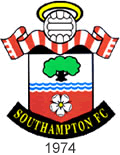 For the 1974-75 season the club introduced a new crest for the first time after a competition held among supporters. Previously the club had used the coat of arms of the city but these did not appear on players' shirts.
For the 1974-75 season the club introduced a new crest for the first time after a competition held among supporters. Previously the club had used the coat of arms of the city but these did not appear on players' shirts.
While still a Second Division side and with Lawrie McMenemy as manager, the Saints sensationally beat Manchester united 1-0 at Wembley to win the FA Cup in 1976. Two years later they were back in Division One and appeared in the League Cup final a year later with Alan Ball, enjoying an Indian summer ten years after winning a World Cup medal, playing a dominant role.
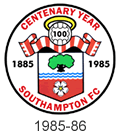 In 1980 unfashionable Southampton signed Kevin
Keegan, twice voted European Footballer of the Year, from Hamburger SV,
a stunning coup for McMenemy. In 1984 the Saints were runners-up in Division
One and reached the semi-finals of the FA Cup. McMenemy left in 1985 and
without his leadership, the Saints have never quite threatened to win
serious honours. On the other hand, the club has remained in the top division,
despite several narrow relegation escapes, and in 2003 they reached the
FA Cup final for the fourth time.
In 1980 unfashionable Southampton signed Kevin
Keegan, twice voted European Footballer of the Year, from Hamburger SV,
a stunning coup for McMenemy. In 1984 the Saints were runners-up in Division
One and reached the semi-finals of the FA Cup. McMenemy left in 1985 and
without his leadership, the Saints have never quite threatened to win
serious honours. On the other hand, the club has remained in the top division,
despite several narrow relegation escapes, and in 2003 they reached the
FA Cup final for the fourth time.
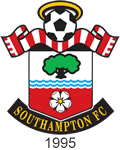 A slightly modified crest was introduced in the mid-Nineties. The design was fundamentally unchanged, only the design of the football being updated. This was probably done so that the new version could be copyrighted to counter the growing problem of counterfeit replica shirts that had become an issue. Both versions of the crest appeared out of a variety of backgrounds as well as being stitched directly onto the shirts.
A slightly modified crest was introduced in the mid-Nineties. The design was fundamentally unchanged, only the design of the football being updated. This was probably done so that the new version could be copyrighted to counter the growing problem of counterfeit replica shirts that had become an issue. Both versions of the crest appeared out of a variety of backgrounds as well as being stitched directly onto the shirts.
In the summer of 2001 the Saints left the Dell, their home since 1898, to move into the new St Mary's Stadium, very close to the church where they began. In their final games at the Dell, the Saints wore the red and white quartered shirts worn by the original St Mary's club. Unusually, the club has not had a contract with any of the major kit manufacturers since 1999, preferring to market replicas under their own brand name.
After their appearance in the FA Cup final in 2003, the Saints qualified for the UEFA Cup. Owing to the rules that required solid colours on the back (their new shirts were striped front and back), the club introduced a special European strip. This was seen just twice in the tie against Steaua Bucarest when Southampton were eliminated.
After 27 seasons in the top flight, the Saints were relegated in 2005 after the controversial appointment of Harry Redknapp as manager (Redknapp had resigned as manager of Southampton's arch-rivals Portsmouth days before his appointment). After intense rumours in the media Redknapp walked out on 3 December 2005 to rejoin Portsmouth leading to an acrimonious legal dispute between the two clubs over compensation. Southampton's chairman Rupert Lowe, who had appointed Redknapp in the first place resigned in June 2006 shortly before he was forced out. Over the following three years the club was plagued by boardroom instability and constant rumours of takeovers, which failed to materialise. Inevitably the club was forced to sell players to raise funds and began to struggle. In April 2009, with the team already relegated, their parent 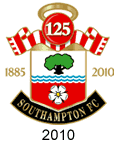 holding company, Southampton Leisure Holdings plc was forced into administration, resulting in the team being handed a ten-point penalty.
holding company, Southampton Leisure Holdings plc was forced into administration, resulting in the team being handed a ten-point penalty.
For their 125th anniversary, the club adopted a smart replica of their first ever strip 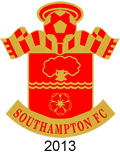 complete with a special commemorative crest for the 2010-11 season. After finishing as runners-up, the Saints returned to the Championship for 2011-12. They won promotion again the following season and for their return to the Premier League, a radical all-red strip was introduced. To the surprise of many (and the discomfort of more than a few supporters) when Adidas took over from Umbro the following season the first choice strip remained all-red with metallic gold detailing while the crest was rendered in gold and red rather than the familiar full-colour version.
complete with a special commemorative crest for the 2010-11 season. After finishing as runners-up, the Saints returned to the Championship for 2011-12. They won promotion again the following season and for their return to the Premier League, a radical all-red strip was introduced. To the surprise of many (and the discomfort of more than a few supporters) when Adidas took over from Umbro the following season the first choice strip remained all-red with metallic gold detailing while the crest was rendered in gold and red rather than the familiar full-colour version.
To the delight of supporters, striped shirts and black shorts were reinstated for the 2014-15 season, produced in house and without branding.
Sources
- (a) Up the Saints - an independent site with a good historical section and comprehensive graphic guide to the club's crest over the years
- (b) The Saints - a Complete Record of Southampton Football Club 1885-1987 (Gary Chalk and Duncan Holley 1987)
- (c) Sporting Heroes
- (d) Official Southampton FC Site
- (e) Nineteen66 Rare Football Memorabilia
- (f) Kuen-Wah Cheung
- (g) David King
- (h) True Colours 2 (John Devlin 2007)
- (i) Alick Milne
- (j) Football League Review
- (k) Andrew Bartlett
- (l) David Juson (Southampton FC Historian)
- (m) Keith Ellis (HFK Research Associate)
- (n) Godfrey Cook
- (o) Chris Nathans
- (p) Willie Kay
- (q) teamead.co.uk - squad photos from 1887 to the present.
- (r) Pavel Shalaev
- (s) Dick Waite
- (t) The Senior Tigers Club
- (u) Simon Monks
- (v) Coloursport
Photograph courtesy of The Saints - a Complete Record of Southampton Football Club 1885-1987 (Gary Chalk and Duncan Holley 1987). Crests are the property of Southampton FC.
